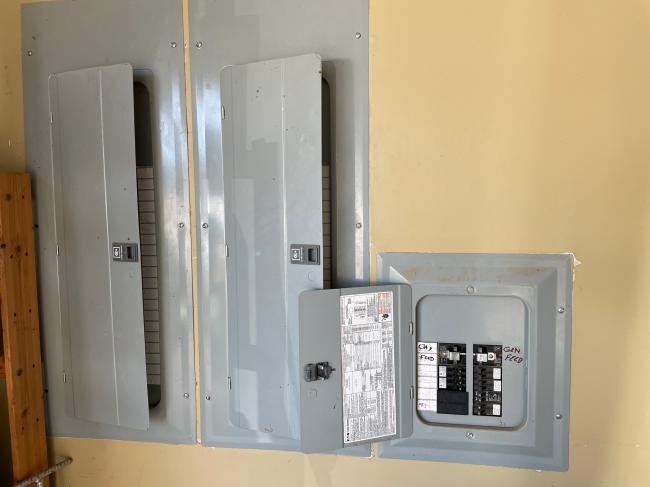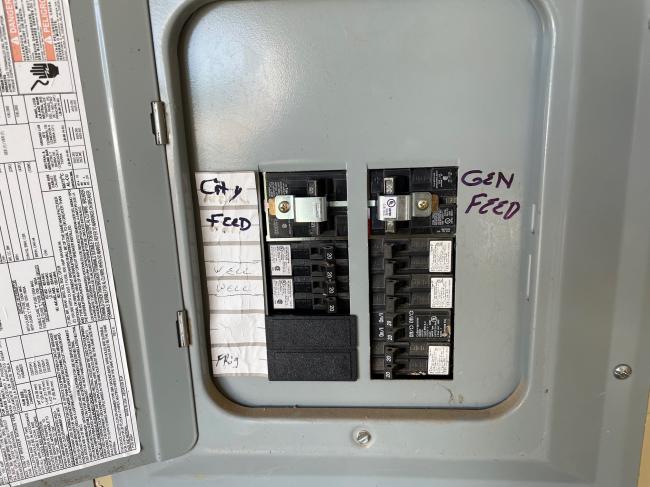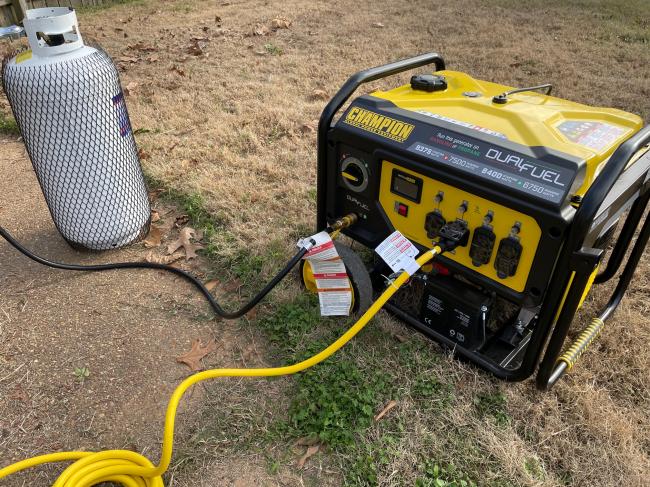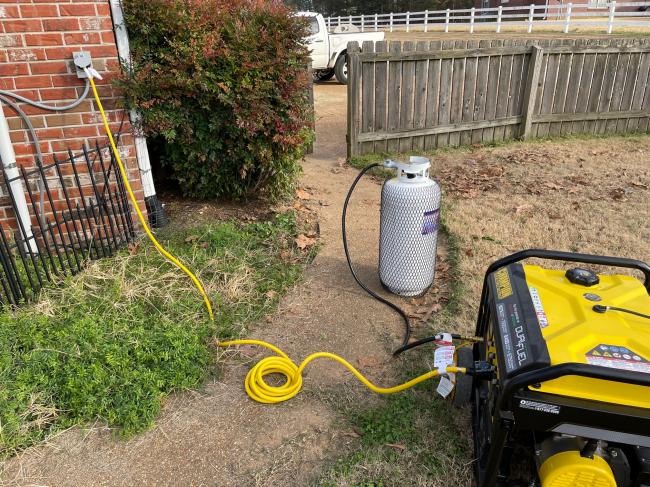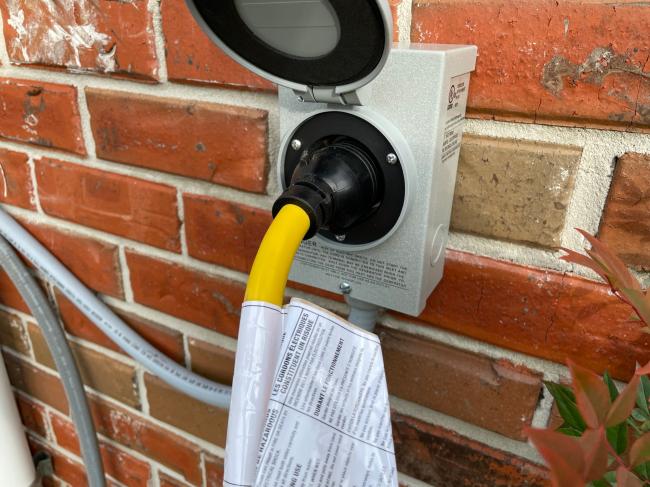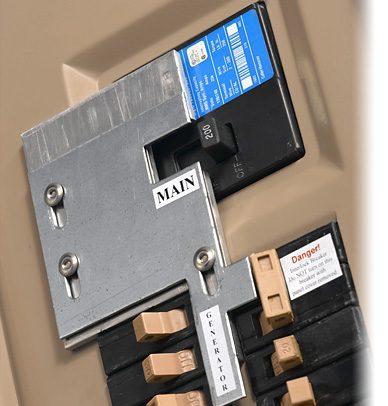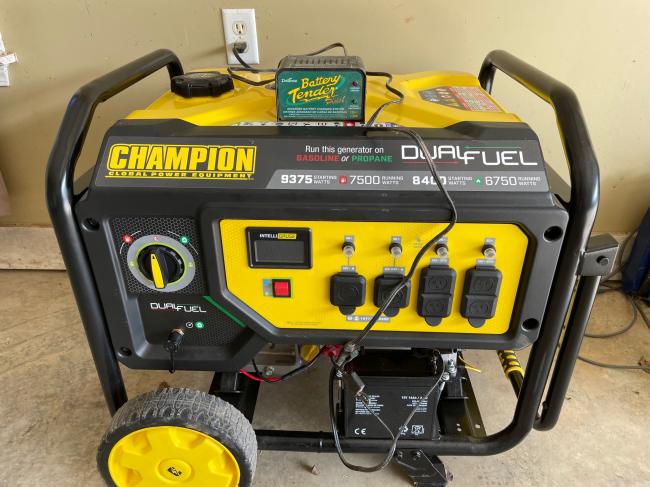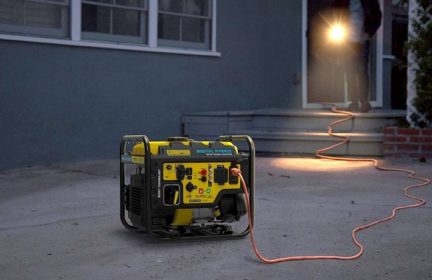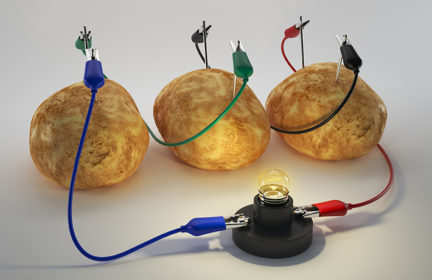My portable generator setup
Thought I might show how I use my portable generator during outages… which can be rather common here in rural America. My generator is about as big as I can handle by myself and provides enough electric to power two electric refrigerator freezers, well pump, about half our lights and around half the receptacles. AC is out of the question using such a generator but since we have natural gas, it will power the blowers on our heaters.
You first will need an electrician to move the electric circuits you wish the generator to power into their own electric panel. You then have to ensure your generator electric can’t feed back into your electric feed coming from the electric company. In my case, there is a bar that connects the breaker with the power company feed to the breaker for the generator feed. With this setup, that electric panel can receive power from either… but not both. So power from the generator can never run back into my main electric panels.
I had an electrician put an outdoor receptacle out on the back of the garage. I have a 30 foot extension which connects from the generator to this receptacle. So when needed you simply start the generator, throw the breaker panel switch… and those circuits now run off the generator. When the electric feed comes back on, you just throw the breaker in the opposite direction… killing the generator feed and turning on the feed from the power company.
My generator is a dual fuel model, meaning it can run off of bottled LP gas or gasoline. My intent is to use just LP gas as it runs cleaner & won’t foul up the ignition system like gasoline can. However, if running for extended time, I have the option of running off of gasoline too.
-
Comments (18)
-
Pops - December 15, 2021
Very cool.
Our last house came with a huge Generac 20k and 500gal propane tank —in town. I think the previous owner was one of those prepper weirdos.
The problem with a huge outfit is you can never use it sparingly. I sold the generac and bought a couple of the little Hondas and installed Cold Mountain (?) LP conversions. It gets me 2 15A or one 30A circuit.
On the new [old] house Ive just installed pigtails on the heater blower and an outlet in the old hard wired line. Normally the pigtail from the heater is just plugged in to that outlet, if I need to use the gen I just run a 12ga extension and plug it in.
Ditto the sump, fridge, freezer, etc. The main benefit to using the cords is you must be conscious of your usage. For me that makes me frugal. We did nearly a month after an ice storm took out thousands of poles in our little coop.
I’ve done it this way in other places, I’ve even used the pulg/pigtail idea on a sub-panel before as a cheap substitute for a transfer switch, the coop engineer told me how. I haven’t seen a setup like yours before, pretty cool.
If we stay here I’ll eventually need a bigger service and will hardwire a gen plug and either pigtail setup or the breaker bit like you have.
-
RedneckContributor - December 15, 2021
When we built this house, we planned for a whole house generator. Well it wasn’t whole house but covered everything I have now, plus one AC unit & the kitchen ovens. Thru the years, we just kept having issues with the big unit. We couldn’t trust it to run when we needed it. The fancy auto transfer switch eventually went bad and that thing cost more than this portable generator. So I decided to deep 6 the big setup and go with a smaller, portable generator.
I feel this portable generator will be more reliable & if it isn’t, I can easily bring it into a shop for repair or can replace without breaking the bank. It also gives me more flexibility, in that I can bring the portable generator elsewhere, if needed. Actually, I would never again put in one big, whole house generator. If I wanted to cover more circuits, I’d simply put in another generator panel for those circuits & duplicate this setup with another portable generator. Having two portable generators running a house makes more sense to me, would be cheaper and would provide much more flexibility.
Whole house generators, with auto start & auto transfer sound real nice… and they are when everything works. But as I soon found out, the more complicated the setup… the more things that can go wrong. I learned the hard way. KISS… Keep It Simple Stupid. This setup now is very simple.
It really isn’t a big deal to have an electrician put in a manual transfer panel, such as mine. You just figure what circuits you want on the generator & he will move that breaker over to the manual transfer panel. And since it is a manual transfer, you can actually bring over more circuits than your portable generator can handle. Say you have 4 refrigerator freezers, All 4 would overload your generator but you can throw the breakers for two of them when running on generator & only run two at a time. After a couple of hours, throw those breakers & turn on the other two breakers. Much easier & safer than moving around extension cords.
-
Pops - December 15, 2021
Did your electrician come up with the bracket or where did you find it?
-
RedneckContributor - December 15, 2021
He purchased it. They sell a smaller, cheaper one but it looked like it would break after a few uses. This one is much heavier.
-
RedneckContributor - December 15, 2021
This looks very similar:
-
Pops - December 15, 2021
Thanks!
-
-
pint of beer - December 16, 2021
pardon my ignorance, but how do you know when the power from the grid is back on if you have thrown the switch and are running off of generator power?
how long do you think you can run your house off of that tank of lp gas? minus the air conditioning of course.
-
Pops - December 16, 2021
I’ll butt in,
Only part of the circuits (the ones in that sub-panel) are on the gen, everything else is still on the main.
-
RedneckContributor - December 16, 2021
No ignorance. We all have to learn. When the grid power is on, it powers all three electric panels… the two large ones and the small one. The two large ones only power their circuits when the grid is on. When the grid power is off, the small panel can power its circuits when the generator is hooked up to its outdoor receptacle, it is running and I have thrown that top interlock switch to the generator side.
So when grid power is off, many of my house’s circuits are off. The only things running are those things powered by the small panel. When the power comes back on, everything is powered. At the point I feel that the power is back on for good, I’ll then throw that interlock switch. That action shuts off any power from the generator & the small panel is then powered from the grid. I then will shut down the generator.
The size of your generator limits what circuits you can run. A generator is rated for how many watts and amps it can provide. Pull too many and the generator will throw a breaker & stop providing power. This generator just powers what I deem essential… some of my lights, some of my receptacles, my two refrigerator freezers, my well, my garage door opener, and a few other items. Our cooktop is natural gas. I have two chest freezers which are not on this generator circuit. I’m afraid they would overload the generator. So if it is a protracted outage, I’ll shut down the two refrigerator freezers for a few hours & run the chest freezers using extension cords. A chest freezer can hold its temp a long time if kept closed, so I would only need to do this probably twice a day.
That is a 40 pound LP tank and I have 6 of them. They each hold a bit under 10 gallons of fuel… that never goes bad as gasoline can. With the generator running at a 50% load, which should be normal, each tank will last 10-11 hours. The 7.7 gallon gasoline tank on the generator would run it for around 5 1/2 hours. I normally keep around 25 gallons of gasoline up in my barn.
-
pint of beer - December 17, 2021
that makes sense now! thank you both for your answers.
-
-
Shaun - December 16, 2021
Redneck,
Nice setup, especially the thought about two smaller generators and a manual transfer switch.
What are your thoughts of a natural gas or diesel setup?
-
RedneckContributor - December 16, 2021
For me, natural gas is a good third option, as I already have it at my house & have a connection right in that area. They make a tri fuel generator, that would also run on natural gas, but it was too expensive for what I wanted. My understanding is that I can purchase a converter kit which would allow me to switch the LP gas feed to natural gas. Such a setup would allow it to run indefinitely during a normal power outage event.
However, I want to keep the generator portable. Using natural gas locks you into specific locations. Running on gasoline is a last resort for me. I’m no mechanic & gas powered motors can easily get a fouled ignition system. LP gas runs very clean. Also gasoline is a much more dangerous fuel to deal with, IMO. I’d most certainly use it if that was the only option but I’d prefer to keep it as a last resort.
Diesel could be a great choice for a portable generator. IMO, it is a better option than gasoline. In my situation, LP gas is plentiful here with several filling locations close by. LP gas can store indefinitely where gas & diesel can go bad. So I felt for me, a dual fuel, LP gas/gasoline, generator was best and would give me the most flexibility.
-
Shaun - December 17, 2021
I share your concern with gasoline risk. I live in town and gasoline storage is limited by ordinance. Anything more than 24-36 hours and I would need fuel. In a power outage it is likely the gas station in town will not be functional since they don’t have a genset. Next station is 12 miles away. I lived through a 9 day power outage in February with nights at 5F and don’t want to do that again. It is my touchstone experience. As a result of those two points I am considering a diesel/NG set but as you said, it’s much more expensive.
It comes down to tradeoffs.
I have learned a lot during research with this site: https://pickgenerators.com/
-
RedneckContributor - December 17, 2021
Correct me if I’m wrong. but my understanding is that it requires no electricity to fill an LP tank. So I figure if there was a long term power outage, one should still be able to get LP gas, when gasoline might not be available.
-
Shaun - December 17, 2021
Yes, you are right but I have seen stations closed without power since most of their product lines are unavailable. Depends on the owner.
-
-
DaveH - December 17, 2021
Thanks for sharing. Very similar to what I’ve done. Wanted to let others know that instead of installing a sub panel, your electrician can add a breaker tie in with a generator interlock kit.
I chose this option because it costs less and gives me greater flexibility about what to back up. I’m not limited to choosing circuits.
The downside is that I need to know what my consumption is and it’s possible that if I weren’t careful I would overload the generator. Every circuit should be flipped off, then the critical loads back on as needed until you max out your power limit. -
Brian Spindel - December 20, 2021
Some great options for switching between line and generator are already suggested here, and still another option is a transfer switch. Going this route allows one to choose which individual circuits are receiving generator power at any one time. https://www.reliancecontrols.com/Products.aspx
-
Bigwig - December 22, 2021
I have a similar setup but like another post I chose to go with an interlock on the main panel versus a transfer switch. This allows me to select any circuit in the house to be run on the generator. My generator can run most of the house except for large power draws like central AC and the oven. It is my responsibility to manage the load such that it doesn’t exceed the generator’s capability.
To monitor when the utility power is back up, I purchased and installed a device called PowerBACK!. It runs off of a 9 volt battery and is turned on when the power is off and will sound an audible alarm when the power comes back on. While not necessary, I wanted something more reliable that looking around my neighborhood and guessing. It does not require an electrician to install but I would only recommend installing it if you have knowledge and experience working in electrical panels.
-
RedneckContributor - December 23, 2021
Putting an interlock on the main panel is certainly an option. Would most certainly be the cheapest safe method of attaching a generator feed to your house.
I hope folks will look into these options. The least efficient option, by far, is the running of extension cords from the generator to your appliances.
-
-
RedneckContributor - December 23, 2021
Here is a pic of the generator in storage inside the garage. I originally kept it stored in my upper barn, but after one use, I changed my mind. Even these medium sized generators are heavy & it wore me out pulling that generator down a gravel drive to the house.
Note I keep a trickle charge attached to the battery. These generators will charge the battery while being used but if it is not used for months, the battery will go dead… or too weak to start. Yes, the generator has a recoil cord to manually start the generator, but it is just way convenient & easy to let the battery starter do the job for you.
-
XKPin - January 2, 2022
Very nice setup offered! Great suggestions too! Here’s my approach, poor man approach based upon funds:
Biggest expense was the EU2200i Honda generator. As the superintendent of a public utility in Hampton Roads for 20-years I found the Honda to take extreme abuse and function flawlessly. It also uses less than 1-gallon of fuel for the same 8-hours run time as my 5500w Coleman for the same loads. Since I can’t afford to run the HVAC or heating system with either genset I have, I simply supply three freezer chests, the water pump, our refrigerator and a fan or portable heater nicely (although I reserved the option to cycle between freezers to feed the electric heating, but never needed to do so).
I avoided the automatic transfer switch (although an OUTSTANDING option worthy of imitating) by connecting directly to the genset. The water pump is no longer hardwired. I installed an outlet and male plug for the pump. Everything is connected by 10-awg extension cords. The Honda handles all the loads nicely.
We have had many, many long term power outages and I have had no issues.
-
- (Official discussion) Rainy day funds and cash on hand - 2 weeks ago
- News of the Week 2024-12-30 - 2 weeks ago
- News for the Week 2024-11-18 - 2 weeks ago
- How to sew and repair a leather glove - 1 month ago
- Moooooooo…Can you rec a powdered milk? - 1 month ago
This forum is heavily moderated to keep things valuable to as many people as possible. Full community policies are here. The basics:
- 1. Be nice to each other.
- 2. Stay focused on prepping.
- 3. Avoid politics, religion, and other arguments.
- 4. No unfounded conspiracies, fake news, etc.
- 5. Debate ideas, not people.
